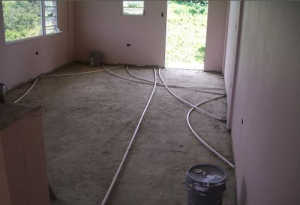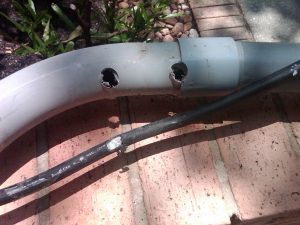A couple years ago here in Florida a termite technician was badly injured while drilling a back porch slab for termites. It wasn’t that the drill bound up and clocked him a good one or a piece of concrete flying up and hitting him in the face. No, this poor guy just happened to drill into an explosive line charge and the explosion was instantaneous. It turns out the community was built on an old military training ground and the happy contractors just poured their cement right on top of a lot of old ordinance. Termite technicians drilling into explosives is kind of rare but still, there are some land mines (of sorts) we should watch out for on every single job or the results could be just as devastating.
The number one disaster a termite tech needs to be on the look out for is pipes. These could be electrical, water pipes or even gas lines and they are quite often poured over with cement or buried in the soil near the foundation by contractors. If the building codes are followed then there is seldom a problem but not everyone adheres to the rules and this is especially true with additions or repairs that were a DIY project. Two of the three pipes I’ve drilled into in my years of termite work were just that. The third was my own fault and I haven’t made the mistake ever again. The one that worried me the most was a gas line in the soil, I smelled the vapors instantly and quickly shut down my auger I was using to install some termite bait stations fearing an explosion. The line was only inches from the surface and should have been down some 18 inches (I was told). For that day I got away with an $80.00 repair bill but more importantly I escaped the potentially deadly situation without being hurt. There are some general rules I always use before firing up my drill or auger and if you have any to add I’d love to hear them. This is one area of termite control that I’ve never been taught or heard anything about in a company meeting so I’m sure I won’t cover it all.
the mistake ever again. The one that worried me the most was a gas line in the soil, I smelled the vapors instantly and quickly shut down my auger I was using to install some termite bait stations fearing an explosion. The line was only inches from the surface and should have been down some 18 inches (I was told). For that day I got away with an $80.00 repair bill but more importantly I escaped the potentially deadly situation without being hurt. There are some general rules I always use before firing up my drill or auger and if you have any to add I’d love to hear them. This is one area of termite control that I’ve never been taught or heard anything about in a company meeting so I’m sure I won’t cover it all.
Every job always starts out with an inspection whether it’s my first time out or I was the one who sold it and am returning to do the work. I take this time to note all spigots, gas meters, pool plumbing, sprinklers, power boxes, cable and telephone lines, bathrooms on exterior walls, wells and any odd plumbing or add on rooms with plumbing or gas lines. I know I should note these things on the graph but I hardly ever do. Instead, I analyze each situation and determine how close I’m willing to get with any tool I have. I try to follow the line or look for clues as to which way it runs and if anything looks screwy about it. I note if it’s pvc, metal or vinyl as is the case for many more modern gas lines. When inside I always see if the tub or shower plumbing is actually on the exterior wall or away. Hardly any job I’ve done has all of these hazards but many houses have multiple combinations.
With the scenario in my head I plan my approach and for any areas I can’t be confident in I simply skip and make no bones about it. I do tell the homeowner and most agree that the expense, mess and possible injury isn’t worth a few drill holes and that information does go on the graph. In the case of a wall that has these dangers but has to be treated I will most often drill the drywall and foam.
When I drill I always use a ‘drill stop,’ This is a device that I plug in to and should my bit hit any grounded metal the drill shuts off immediately. ( I highly recommend using one) Drilling is hard work and you are often bending over in an odd way or contorting yourself in a crawl space but you must always be looking at the bit as it is penetrating the concrete and kicking out the fine dust. Should any metal or pvc flakes appear stop drilling and examine what you’ve got. If you’re at all unsure re-examine the area and pick a different spot to drill your hole. If my stop device cuts my drill off I get real nervous and pray I don’t see a bubbling stream of water coming up or smell gas. It’s most often re-bar but once you’ve hit a pipe you’re always wary.
The biggest mistake I see techs do is ramming that bit through the cement to clear the hole once drilled or pushing down really hard while drilling. Most pipes are punctured this way more than any other. Let the drill do the work and when you get your ‘drop’ don’t let the bit plunge into the newly drilled hole. If you know the pad is 4 inches then get ready to pull up once you’ve popped through. You’re treating rod can clear the hole later when you are injecting and the injector tool is way more forgiving should there be a pipe lying there in wait. This drop can be tougher to curtail for block drilling since the cement is so thin but you need to take it easy and be in control.
Well, like I said I don’t think I have all the tips on this particular subject and if something you can share will save me a $450.00 repair bill I’m all ears. This subject came up for me just today when a client showed me a drilling mishap that by all rights should have cost the driller his life. I’ve made mention in my blog that electricity is the #1 killer of pest control technicians but thank God this guy didn’t become part of that statistic and he even tried twice. In the picture you can see the drill holes through the gray electrical pipe and the thick electric cable he nicked down to bare metal. This came about because he decided to drill the block from the exterior rather than take the time and crawl under the home to do the job. This so called work was done a year ago and the home had problems with gfi’s popping and blown sockets ever since until they finally traced it to the source. In the end I guess the termites were killed but this guy should thank the Good Lord that he didn’t die right along side of the insects.




